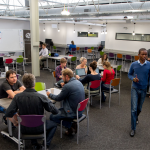Silicon Cape was founded by Vinny Lingham and Justin Stanford in 2009. The two developed the startup to represent the Cape Town’s tech startup scene. After the launch, the Cape Town’s startup scene changed for the best. Silicon Cape is on the verge of reviewing its strategy. This comes after the resignation of Ellen Fischat, Silicon Cape’s managing director. Alexander Fraser who is a top director at the Silicon Cape also resigned.
The venture has played an important role in the success of the city’s startups. This was its main objective of which it managed to successfully attain. This is evident from the recent success enjoyed by Cape Town startups. The tech startup scene had a different look before compared to after the launch.
Before the launch, there was no any startup community or ecosystem. In 2004 when Stanford launched angel investing the startups did not have any knowledge of the existence of each other. This is to mean there was neither venture capital nor angel investing. Press never covered the startups making them remain underground. The country relied on the old age type of business culture. The startups tried their best to keep their game plans as private as possible.
This was quite different compared to the operations at the Silicon Valley. At Silicon Valley, there was a hardworking team with open and updated working culture. There was much sharing of ideas and partnership. This allowed everyone to have knowledge of each other. Many founders changed into angel making them invest into a new group of founders. In 2004 Silicon Valley was less known globally. There were no regional startup hubs and startup go-to locations.
That was the right time for a venture to come up and give the Cape Town’s startup another different look. Silicon Cape, therefore, came in to fill that wide gap that was there. The venture was started to showcase Cape Town’s ability in growing startup into a world company. Furthermore, it was to prove to the world that Africa had a potential to move into the global startup map. The founders wanted to bring together all the tech startup interested parties and make a change.
In a period of ten years after the Silicon Cape’s launch, the startup community has changed and grown above expectations. The move helped to bring out the untapped potential that was there before. But regulatory measures still remains the main challenge to the startup ecosystem. Many organizations are now working on reducing or doing away with the regulations such as Exchange Control regulations.


